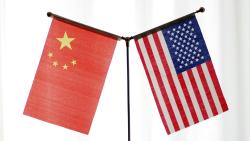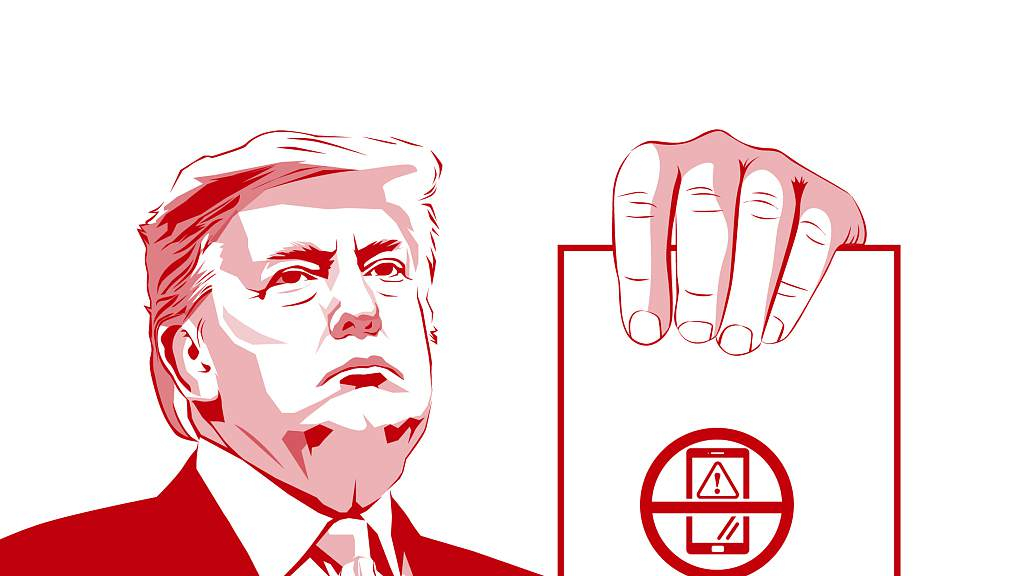
Editor's note: Andrew Korybko is a Moscow-based American political analyst. The article reflects the author's opinions, and not necessarily the views of CGTN.
Many observers have taken to describing the U.S. self-perceived global rivalry with China as a New Cold War, which is difficult to argue with at this point, at least in terms of how it's increasingly beginning to appear to many across the world. This doesn't mean that China shares that perception, but simply that the U.S. is formulating its aggressive policies based on the belief that China is the top threat to its fading unipolar hegemony. Somewhat naturally, then, the U.S. has begun to rely on its playbook from the Old Cold War.
That former worldwide struggle saw the U.S. actively "contain" the erstwhile USSR. Although ideological differences between them seemed to be the driving motivation behind their competition, it can be argued that the core of the U.S. suspicions of the USSR was really geopolitical. From a cynical perspective, its decision to focus almost exclusively on their ideological differences was convenient for domestic political reasons.
It's well-known that positively comparing one's own government to a misportrayed "other" is a common tactic for strengthening domestic support. No system is perfect, but the American one has more structural flaws than its representatives feel comfortable acknowledging. For example, American-Austrian "public relations" expert Edward Bernays' 1928 book about "Propaganda" exposed how easily people in Western democracies can be manipulated, while the 2008 financial crisis showed how unstable the U.S. economic system really is.
Deeply insecure due to how conscious it is of its own in-built systemic vulnerabilities (which the elite arguably exploit to their advantage at the expense of the masses), the U.S. has an interest in distracting its population from their problems by instead presenting their country as the best possible place to live on the planet's history. Simply referring to "American Exceptionalism" is no longer as convincing as it once was due to the rise of mass media early last century, hence the need to manipulate the concept of "the other" to this effect.

President Donald Trump issues an executive order banning United States companies from using the information and communications technology from anyone considered a national security threat, May 15, 2019. /VCG
President Donald Trump issues an executive order banning United States companies from using the information and communications technology from anyone considered a national security threat, May 15, 2019. /VCG
The USSR was the U.S. foil during the Old Cold War, then Islam played this role during the so-called "Global War on Terror" (GWOT), and now it's China in the New Cold War. Each time, the U.S. used the excuse of countering a "dangerous foreign ideology" (communism in both Cold Wars and Islam in GWOT) as the cover for aggressively expanding its geopolitical interests across the world. Since the U.S. is nowadays relying on its Old Cold War playbook, it predictably decided to target China for convenience's sake.
Unlike the last time, this effort is much less convincing than before. China doesn't export its ideology across the world like the Communist Party of the Soviet Union (CPSU) openly did. It also doesn't consider itself to be in a global competition with the U.S. Rather, China is focused on advancing the developmental goals of its population and the country's foreign partners who voluntarily seek its assistance. By contrast, the USSR had an informal prerequisite that its foreign partners be "ideologically compatible" with it to a degree.
Nevertheless, the U.S. expects that its control over the mainstream media will enable it to hide these "inconvenient truths" from average Americans. It expects that repeating anti-communist slogans and demonizing China will trigger the Pavlovian reflex that its people have been heavily conditioned for decades to make in response to what they've been misled to believe is the so-called "threat to their way of life" posed by a foreign country. The manufactured fear that they feel then blinded them to their many domestic problems.
Not only that, but it also makes them more likely to support their country's aggression halfway across the world against China (which is highly profitable for the elite-connected military-industrial complex), all in the name of supposedly "containing" China. Few Americans realize that their own country's systemic vulnerabilities are the real threat to their way of life, not China, and its development-driven agenda. The U.S. pathological obsession with China is therefore, an unconvincing self-interested manipulation of the truth.
(If you want to contribute and have specific expertise, please contact us at opinions@cgtn.com.)